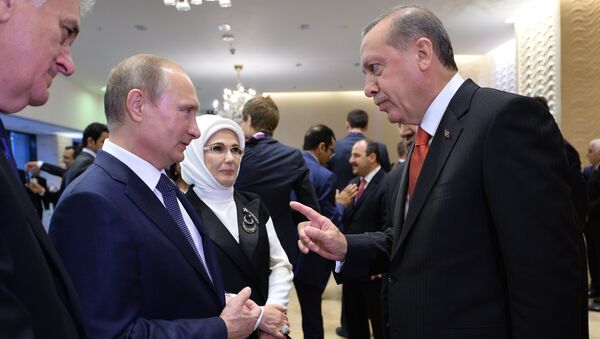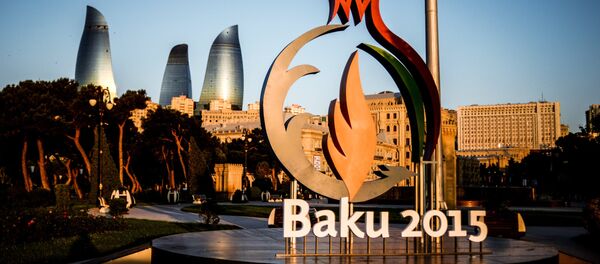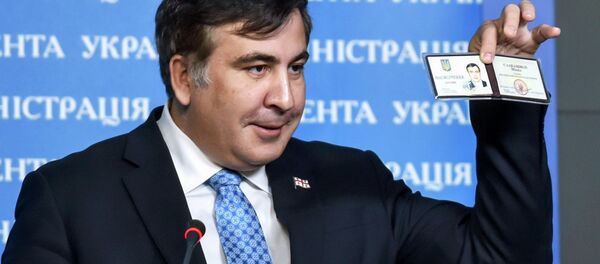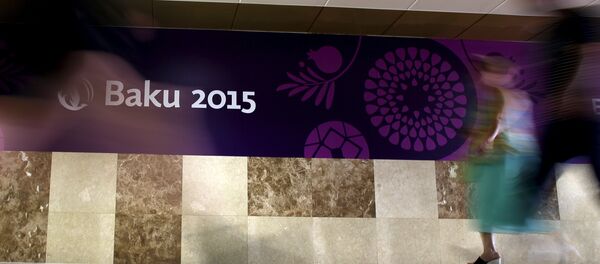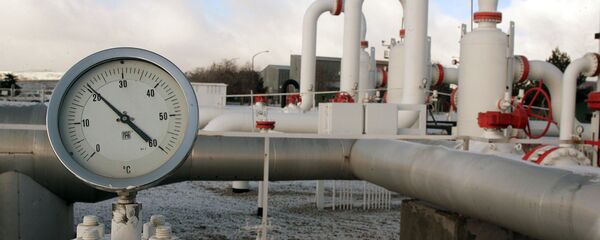MOSCOW (Sputnik) — The 16-day tournament is the first high-profile sporting event hosted by the Central Asian nation. It reportedly cost Azerbaijan a hefty $10 billion, bringing together nearly 6,000 athletes from 50 countries.
On the second day of his visit to Baku, the Russian leader is expected to meet with the president of the host country, Ilham Aliyev, to discuss bilateral ties and the tensions around the disputed Nagorno-Karabakh region in the South Caucasus.
Another fringe meeting between Vladimir Putin and Turkey’s Recep Tayyip Erdogan is anticipated to focus on energy cooperation and the Syrian crisis, Putin’s spokesman Dmitry Peskov said.
Russia-Azerbaijan
The trade turnover between the two neighbor countries peaked $4 billion in 2013, up 12 percent from the previous year. The trade flow climbed steadily by 5.8 percent in the first quarter of 2015 compared to the same period last year.
Putin and Aliyev are also expected to assess the progress on decisions made at the 2014 Summit of Caspian Sea States. The sea is bordered by five countries – Russia, Azerbaijan, Kazakhstan, Turkmenistan, and Iran, – and all of them lay claims to its reserves of fish and oil.
The Russian leader is anticipated to raise the ongoing conflict in the disputed Nagorno-Karabakh, a landlocked mountainous region in Azerbaijan, close to its border with Armenia. It population is predominantly Armenian.
The territory proclaimed itself independent in 1991, prompting a large-scale war with Azerbaijan that lasted until a Russian-brokered ceasefire was signed in 1994. Since 1992, Russia has also been a member of an OSCE security group’s trilateral body – co-chaired by Russian, French and US representatives – that seeks to negotiate a lasting peace in Nagorno-Karabakh.
Russia-Turkey
Putin’s Saturday meeting with Erdogan will come in the wake of last Sunday’s parliamentary elections in Turkey that saw the ruling pro-Erdogan party lose its majority in the country’s legislature, in what is expected to bring a major change in Turkish politics.
Putin’s spokesman said the two leaders have not met one-on-one in ages. "Of course, they’ll need to coordinate their stances on complicated situations in the regional affairs – such as Syria, as well as trade and economic cooperation between our two nations, and joint work on major projects including in the energy sector," Peskov said.
The two countries are important trade and economic partners, he said, stressing their joint energy project – the so-called Turkish Stream – was still of particular significance to both Moscow and Ankara.
In late 2014, Russia abruptly dropped its long-overdue pipeline project to pump natural gas to the European Union via Bulgaria and other Eastern and Central European nations, bypassing Ukraine, after it hit a roadblock in talks with Brussels over its legislation.
A new pipeline is expected to make landfall in Turkey before crossing into Greece. Its capacity is estimated at 63 billion cubic meters annually, of which up to 47 billion will be earmarked for Turkey. There are also plans for a gas hub on the Turkish-Greek border to store EU gas supplies.
In 2014, Russia supplied Turkey with 27.4 billion cubic meters of natural gas via two pipelines – the Blue Stream under the Black Sea and the Trans-Balkan line running across Ukraine. But Russia hopes to stop gas transit through Ukraine after 2019.
